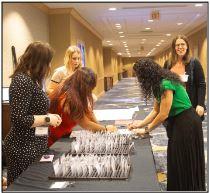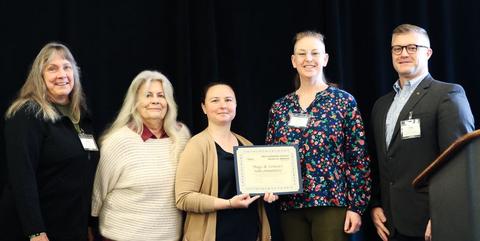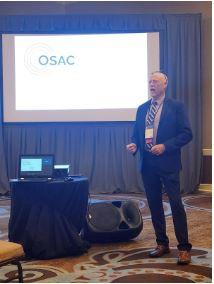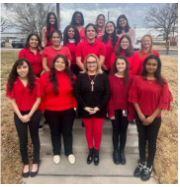June 2024
This Standards Bulletin from the Organization of Scientific Area Committees (OSAC) for Forensic Science provides a monthly update on forensic science standards moving through the OSAC Registry and standards development process, along with other OSAC news and standards-related information.
FORENSIC SCIENCE STANDARDS UPDATES
OSAC Registry Updates

The following OSAC Proposed Standard has been added to the OSAC Registry, effective June 4, 2024.
Standards Open for Comment
SDO Published Standards Under Consideration for the OSAC Registry
The OSAC Registry approval process for published standards is used to review existing SDO published standards for technical quality and placement on the Registry. Please submit your comments by 11:59 p.m. ET on July 1, 2024, on whether the following SDO published standards should be included on the Registry:
- ANSI/ASB Standard 134, Standard for Analyzing Pathological Conditions and Anomalies in Forensic Anthropology. 2021. 1st. Ed. Submit your comments here.
- ANSI/ASB Standard 135, Scene Detection and Processing in Forensic Anthropology. 2023. 1st. Ed. Submit your comments here.
- ANSI/ASB Standard 146, Standard for Resolving Commingled Remains in Forensic Anthropology. 2021. 1st. Ed. Submit your comments here.
- ANSI/ASB Standard 154, Standard for Training on Testimony for Forensic Biology. 2024. 1st. Ed. Submit your comments here.
OSAC Proposed Standards Under Consideration for the OSAC Registry
The following OSAC Proposed Standards are being considered for the OSAC Registry and are open for comment. To be considered, comments must be placed in the OSAC Comment Form and sent to comments [at] nist.gov (comments[at]nist[dot]gov) by 11:59 p.m. ET on July 1, 2024.
- OSAC 2024-S-0006, Forensic Documentation for the Reporting by Oral Health Care Professionals of Suspected Human Abuse.
- OSAC 2024-S-0013, Proposed Standard for Photographing of Dental Evidence.
- OSAC 2024-S-0014, Best Practice Recommendation for Muzzle-to-Witness-Panel Distance Measurement and Estimation of Uncertainty.
- OSAC 2024-S-0015, Standard Guide for Evaluating Physical and Optical Characteristics in Forensic Tape Examination and Comparison.
- OSAC 2024-S-0016, Standard for Case File Management and Reporting in Forensic Anthropology.
- OSAC 2024-S-0017, Standard Guide for Forensic Physical Fit Examination of Documentary Evidence.
Standards Open for Comment at Standards Development Organizations (SDOs)
There are 16 forensic science standards currently open for public comment at:
- Academy Standards Board (ASB):
- crime scene investigation and medicolegal death investigation standards with a public comment deadline of June 17, 2024.
- firearms & toolmarks, friction ridge, and medicolegal death investigation standards with a public comment deadline of July 8, 2024.
- ASTM: gunshot residue, fire debris and explosives, trace materials, and interdisciplinary standards with a public comment deadline of June 17, 2024.
Visit OSAC’s Standards Open for Comment webpage to access these documents and for the instructions on how to submit your comments.
SDO Updates
New Published Standards
From the ASB:
- ANSI/ASB Standard 055, Standard for Breath Alcohol Measuring Instrument Calibration. 2024. 1st. Ed. (new standard).
- ANSI/ASB Standard 133, Standard for Age Estimation in Forensic Anthropology. 2024. 1st. Ed. (new standard).
- ANSI/ASB Standard 167, Standard for Reporting Written Results from Friction Ridge Examinations. 2024. 1st. Ed. (new standard).
- ANSI/ASB Standard 180, Standard for the Selection and Evaluation of GenBank® Results for Taxonomic Assignment of Wildlife. 2024. 1st. Ed. (new standard).
- NOTE: This is OSAC 2021-S-0006, Standard for the Use of GenBank for Taxonomic Assignment of Wildlife, currently on the OSAC Registry.
From ASTM International:
- ANSI/ASTM E2917-24a, Practice for Forensic Science Practitioner Training, Continuing Education, and Professional Development Programs (revision of ANSI/ASTM E2917-2024 with the addition of an annex for scene investigator training, continuing education, professional development, certification/licensure and accreditation).
- NOTE: ANSI/ASTM E2917-19a is currently on the OSAC Registry.
Work Proposals for New or Revised Standards
On May 17, 2024, a Project Initiation Notification System (PINS) was published on pages 2-4 and 6 in the ANSI Standards Action. This will begin ASB’s and ADA’s work on the following standards:
ASB:
- ASB Standard 022-202x, Standard for Forensic DNA Analysis Training Programs (revision of ANSI/ASB Standard 022-19, which is currently on the OSAC Registry). This standard provides the requirements for a forensic DNA laboratory’s training program in DNA analysis including data interpretation, comparison, statistical analysis, reporting, and testimony.
- ASB Standard 040-202x, Standard for Forensic DNA Interpretations and Comparison Protocols (revision of ANSI/ASB Standard 040-19, which is currently on the OSAC Registry). This document sets requirements for a forensic laboratory’s DNA interpretation and comparison protocol. This document applies to any type of DNA testing technology and methodology used including, but not limited to, STR testing, DNA sequencing, SNP testing, haplotype testing, and traditional and rapid protocols.
- ASB Standard 105 e2-202x, Minimum Education Requirements for Firearm and Toolmark Examiner Trainees (revision of ANSI/ASB Standard 105-21). This document provides the minimum education requirements for forensic laboratory applicants and employees entering a training program in firearm and toolmark examination. This document does not apply to previously trained and qualified firearm and toolmark examiners who may be temporarily referred to as trainees when they change employment.
- ASB Best Practice Recommendation 210-202x, Best Practice Recommendation for Population Affinity Estimation in Forensic Anthropology (new standard). This document provides best practices, guidelines, and preferred morphological and metric methods for estimation of population affinity from adult skeletal remains. This document does not provide minimum requirements for estimating population affinity as these are covered in ANSI/ASB Standard 132.
- ASB Best Practice Recommendation 211-202x, Best Practice Recommendation for Sex Estimation in Forensic Anthropology (new standard). This document provides best practices, guidelines, and preferred morphological and metric methods for estimation of sex from adult skeletal remains. This document does not provide minimum requirements for estimating sex as these are covered in ANSI/ASB Standard 090.
- ASB Best Practice Recommendation 212-202x, Best Practice Recommendation for Stature Estimation in Forensic Anthropology (new standard). This document provides best practices, guidelines, and preferred metric methods for estimation of stature from skeletal remains. This document does not provide minimum requirements for estimating stature as those are covered in ANSI/ASB Standard 045.
ADA:
- ADA Standard No. 1088-202x, Dentistry – Human Identification by Comparative Dental Analysis (new standard). This standard defines the requirements for identifying an individual by comparative dental analysis.
IMPLEMENTATION IMPACTS & RESOURCES
Help OSAC Collect Valuable Implementation Data by Encouraging Your Agency to Declare Implementation
The forensic science community has made a tremendous amount of progress with respect to standardization of its practices. Hundreds of volunteers have directly contributed to these efforts through their participation in OSAC and the various standards development organizations that are each diligently working to continually expand and improve our national system of forensic science standards. The best way to demonstrate the impact and extent of these efforts is to declare implementation through the OSAC Registry standards implementation declaration process. When submitted, this data helps OSAC better evaluate the program, identify needs in the standards arena, and channel critical feedback to the entities responsible for developing and improving forensic science standards.
If your agency is not currently listed amongst the known list of implementers, please work with your administration to encourage submission of a declaration form!
For additional information on implementation and to access the declaration form, visit the OSAC Registry Implementation webpage.
Open Enrollment, It's Not Just for New Implementers

OSAC’s Open Enrollment will be returning in 2024 with the goal of collecting additional OSAC Registry standards implementation data! The 2024 Open Enrollment period will extend from July 1 through September 2. It will end just before National Forensic Science Week (September 14-21), during which time various communications will be distributed about implementation data collected during the open enrollment.
Although the primary focus of this endeavor is to add more implementers to the list, this is also a great opportunity for current OSAC Registry implementers to update their information.
How does open enrollment benefit your agency?
Implementing standards on the OSAC Registry and submitting a new or updated declaration form has many significant benefits! Here are just a few:
- Keep pace with the more than 150 other leading laboratories and organizations who have been recognized for embracing nationally recognized forensic science standards!
- Celebrate the benefits of improved communication among your staff and demonstrate to critical stakeholders another reason why they can depend on your agency for the highest quality service.
- Capitalize on your quality assurance achievements by joining the national cohort of standards implementers who regularly share updates on new tools and training on how to meet challenges of implementation and increase transparency of efforts toward compliance with new and existing standards.
In addition to acquiring new implementer data, updated information from the existing cohort of implementers will enable us to:
- Report more accurate information with respect to the numbers and types of standards that are being implemented.
- Enable better communication with implementers that are declaring incorporation of specific standards in their protocols.
- Better demonstrate the full extent of implementation to the entire criminal justice community and legislative bodies across the nation.
If your agency has already declared implementation of OSAC Registry standards, but has not updated their information for some time, please consider doing so during the 2024 open enrollment period.

Forensic Standards Implementation Mentor Program

Do you know of a Forensic Science Service Provider (FSSP) that is interested in implementing the standards on the OSAC Registry and does not know where to start? Pass along the Mentee Request Form and help them connect with a mentor.
Has your organization implemented standards on the OSAC Registry and is interested in becoming a mentor to others? Complete the Volunteer Mentor Form. When the program launches, you will be connected with a mentee in similar jurisdiction, size, and discipline(s).
Learn more about OSAC’s Forensic Science Standards Implementation Mentor Program and help make an impact on implementation.
Is your organization implementing standards on the OSAC Registry?
Complete OSAC’s Registry Implementation Declaration Form found on the OSAC website and send it to forensics [at] nist.gov (forensics[at]nist[dot]gov) to let us know. Your organization will subsequently be awarded an OSAC Registry Implementer Certificate.
Interested in learning more about implementation? Check out OSAC’s Implementation Recognition Factsheet.
Forensic Science Standards in the Courts

A Kentucky district court recently considered the applicability of ANSI/ASB Standard 037, Guidelines for Opinions and Testimony in Forensic Toxicology in the context of a defense motion to preclude testimony from the government’s forensic toxicologist. United States v. Simpson, 2024 WL 86856 (E.D.Ky. 2024). In that case, which involved the sale of drugs resulting in death, the defense moved to prevent the government toxicologist from offering any testimony that ANSI/ASB 037 labels as “generally inappropriate.” The government pointed to the non-binding nature of the Guidelines, and argued that, as recommendations, they could not impact admissibility determinations. It also argued that its expert’s testimony would not exceed the recommendations of ANSI/ASB 037 in any event. The court ultimately agreed with the government on both grounds. It found that it could not use the Guidelines to preclude testimony without intruding into the jury’s realm of responsibility. It also determined that, with the exception of the expert’s testimony that his opinions were to a “reasonable scientific and toxicological certainty,” the testimony was within the Guidelines. The defense motion to preclude was denied.
OSAC NEWS
2024 OSAC Meetings - That's a Wrap!

On May 14-16, over 215+ OSAC members and guests in Biology, Medicine, Chemistry: Trace Materials, and Physics/Pattern Interpretation SACs and their subcommittees met in Jacksonville, Florida for the last OSAC All Hands Meeting of the year. Together, an astounding 380+ volunteers met in-person to create consensus forensic science standards and other work products. The OSAC Program Office is receiving an increase in draft documents that are ready to begin the STR and/or OSAC Registry approval process!
A SINCERE THANK YOU TO ALL members and affiliates for your continued passion, dedication, and efforts to support the OSAC mission. The forensic science community appreciates the time you are volunteering to unify forensic science standards.
2024 OSAC Distinguished Individual Service Award
During the spring meetings, the OSAC Distinguished Individual Service Awards (given to a member of each SAC) and one Outstanding Group Award were presented to those who have gone above and beyond in their service to OSAC.
Congratulations to the following 2024 award recipients:

- Biology SAC: Michael Marciano (member of the Human Forensic Biology Subcommittee)
- Chemistry: Seized Drugs & Toxicology SAC: Lyndsay Cone (member of the Forensic Toxicology Subcommittee)
- Chemistry: Trace Evidence SAC: Laura Hernandez (member of the Ignitable Liquids, Explosives & Gunshot Residue Subcommittee)
- Digital/Multimedia SAC: Rand Swartz (member of the Video/Imaging Technology & Analysis Subcommittee)
- Medicine SAC: Bryan Johnson (member of the Medicolegal Death Investigation Subcommittee)
- Physics/Pattern Interpretation SAC: David Kanaris (Footwear & Tire Subcommittee Chair)
- Scene Examination SAC: Charles DeFrance (Crime Scene Investigation & Reconstruction Subcommittee Chair)
2024 Outstanding Group Contribution Service Award
Congratulations to the Dogs & Sensors Subcommittee for receiving the 2024 OSAC Outstanding Group Contribution Service Award in Indianapolis, IN!

Dogs & Sensors Subcommittee Members: Dr. Paola Prada-Tiedemann (Chair), Suzy Perry (Vice Chair), Kenneth Furton, Frederick Helfers, III, Julia Leighton, Herbert Nakamura, Cindy Otto, John Pearce, Adele Quigley-McBride, Craig Schultz, Melissa Singletary, Katylynn Sloan, Barbara Weakley-Jones
Do you want to participate in the standards development process and make an impact on the forensic science community?
Complete and submit OSAC’s online application form to be eligible and considered for OSAC membership.
Call for Nominations: 2024 Sharon B. Nakich Award

OSAC is seeking nominations for the 2024 Sharon B. Nakich Award. In honor of our colleague, Sharon Nakich, this OSAC peer-to-peer award acknowledges a helpful attitude, kindness, teamwork, or behind-the-scenes contributions to support the goals of OSAC. It recognizes an individual who has made significant contributions to promote OSAC’s mission through their support of OSAC. This nominee works diligently and tirelessly as a champion for OSAC, at times without recognition.
Eligibility:
- All OSAC members and affiliates
- Any non-OSAC member who has contributed significantly to furthering the mission of OSAC
To submit your nomination, please provide two or more narrative statements from two or more different individuals addressing the criteria mentioned above. Nomination justifications should include, but are not limited to, a description of:
- Specific activities the nominee was involved in that had a positive effect in supporting OSAC’s mission,
- How the individual’s action helped the organization further its goals
- Describe the nominee’s willingness to go the extra mile.
Please send your nomination and supporting documentation to Crystal DeGrange (crystal.degrange [at] nist.gov (crystal[dot]degrange[at]nist[dot]gov)) by Friday, August 23, 2024.
OSAC OUT & ABOUT

One of OSAC’s Standards Ambassadors, Steve Johnson, recently spoke at two subdivision meetings of the International Association for Identification (IAI). The IAI is the world’s largest and oldest forensic practitioner organization and a long time supporter of the OSAC mission. The Chesapeake Bay Division Conference of the IAI (CBD-IAI) Meeting was held May 13-15 in Ocean City, MD, and the Texas Division of the IAI (TDIAI) Conference was held May 28-30 in Corpus Christi, TX. Steve shared information on OSAC’s standards implementation efforts with a focus on “non-traditional” forensic science service providers. The CBD-IAI and TDIAI memberships are primarily made up of front-line practitioners who are trained in many of the crime scene and pattern disciplines, most notably friction ridge, crime scene investigation and reconstruction, bloodstain pattern analysis, face and iris identification, and footwear/tire examination. These front line professionals are the important link between the standards in these ”non-traditional” disciplines and their supervisors/quality managers who will make the ultimate decision to implement them.
Inside the Laboratory: The Forensic Analytical Chemistry and Odor Profiling Laboratory at Texas Tech University.

In this article, OSAC’s Dogs & Sensors Subcommittee Chair, Paola Tiedemann, talks about her research group and current projects they are working on.
UPCOMING EVENTS
- June 3 - 6: Pacific Northwest Division of the International Association for Identification (PNDW-IAI) Conference | Missoula, MT
- June 3 - 7: Facial Identification Scientific Working Group (FISWG)
- June 4 - 7: Florida International University (FIU) Global Forensic Science Symposium | Miami, FL or virtual
- June 9 - 10: FSSB Summer Quarterly Meeting | Dulles, VA
- June 24 - 27: National Sheriffs’ Association Annual Conference | Oklahoma City, OK
- June 25 - 28: Bode Annual Forensic DNA Conference | Atlanta, GA
- July 16: Scientific Working Group DNA Analysis Methods (SWGDAM)
- August 12 - 16: International Association for Identification Annual Conference (IAI) | Reno, NV
OTHER FORENSIC SCIENCE NEWS & TRAINING
AAFS Standards Resources and Training
As part of a cooperative agreement with NIST, the American Academy of Forensic Sciences (AAFS) is developing training, tools, and resources to enhance implementation efforts and broaden awareness of forensic science standards among communities of interest.
- Standards factsheets provide a clear, concise, and easy way to understand the purpose of a specific standard, why it is needed, and the benefits of adoption. Standards factsheets are available for 135+ standards on the OSAC Registry.
- Standards checklists are a tool that forensic science service providers can use to track progress towards implementation, identify gaps or barriers to implementation, or document objective evidence of implementation or compliance with a standard. Checklists are available for 130+ standards on the OSAC Registry.
- Standards videos and webinars are available for free from AAFS Connect. Learn about the standards development process, standards development activities in various disciplines, and information about specific SDO published standards on the OSAC Registry.
CONNECT WITH OSAC

Follow us on Social Media. To stay up to date on the latest OSAC news, be sure to follow us on LinkedIn (#ForensicOSAC).
Contact Us. If you have feedback, questions, or want to learn more about how you can help strengthen forensic science through standards, contact us at forensics [at] nist.gov (forensics[at]nist[dot]gov).

